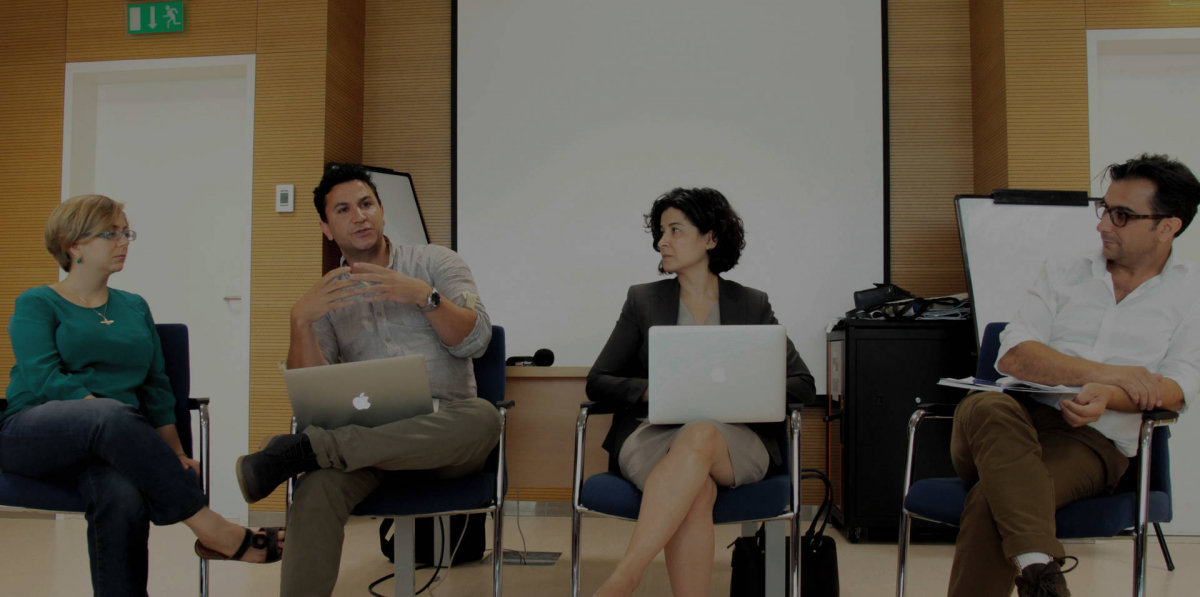September 24, 2014: The Department of Social Sciences at the American University of Iraq, Sulaimani (AUIS) hosted a panel discussion on the ongoing conflict in Iraq and its impact on survivors of the Islamic State’s waves of violence.
The dialogue was organized and moderated by Edith Szanto, assistant professor of religion and history at AUIS, and included three speakers: Fazil Moradi, a researcher at the Max Planck Institute for Social Anthropology and lecturer at the University of Halle in Germany; Hawar Moradi, a medical doctor, specializing in psychiatry and currently working as a volunteer at refugee camps throughout Kurdistan; and Choman Hardi, AUIS faculty member, poet, and researcher in gender and violence studies.

Hawar Moradi began the panel discussion by pointing out that displacement is not only physical, but also psychological. At various Ezidi camps, he has been seeing 300 to 400 patients daily. Ezidis have been and continue to be deprived of their way of living, and they will carry trauma with them for the rest of their lives. They come with physical illnesses, but most of them are also in dire need of psychological support.
Hardi said that in addition to dealing with trauma, survivors also often feel isolated from the rest of society. Women are more vulnerable, especially if they have experienced physical or sexual abuse, and remain at risk of violence even in refugee camps. It is also not easy for them to talk about sexual abuse and rape as they are often stigmatized. This disconnection and erosion of trust in the wider community makes them feel betrayed, unprotected, and more isolated.
Fazil Moradi has been visiting Ezidi communities and those taking refuge in camps, unfinished buildings, parks, school buildings, and gas stations around Kurdistan. These survivors carry memories of acts of genocide and displacement and these memories take on lives of their own. An Ezidi survivor “carries total loss and an absence of a life once lived, including family and community history, language, memories of home and socialization.” He emphasized the “impossibility and untranslatability of experiences of acts of genocide. Therefore Ezidis cannot be seen as usual refugees.”
Replying to a question on how Ezidis survive their current situation, Hawar Moradi said that it is extremely difficult to articulate the reality and experience of their displacement. And, he reiterated that the experiences of women and children are different from those of men. While men are more often killed on the spot, women are left with a tragedy. Every instance of displacement constitutes suffering, and that is all that remains as a form of survival.
In describing the social and intellectual context of acts of extermination, Fazil Moradi referred to “genocide ideology.” He explained that genocide is not only something physical, but also psychological. People can be eliminated without being killed; the historical existence of Ezidis is a clear example. Hardi added that genocide never happens in a vacuum. There is always already an ideology which permits the victimization of a group of people. The Islamic State’s genocidal attacks against Ezidis were drawing on a preexistent ideology, which mobilized local accomplices.
Fazil Moradi argued that Iraq has totally marginalized the need for dealing with claims of justice, reparations, and reconciliation. He added that the Iraqi state has failed in configuring an independent legal system and political accountability: “it is a decomposed state and unless you have an accountable state, Ezidis remain vulnerable to experiencing further genocidal attacks.”
Fazil Moradi extended the argument and stated that there is no effective effort in dealing with the magnitude of violence in post Ba’ath Iraq. He critiqued the normalization of the Ezidi experience, which he thinks perpetuates their extermination: “It should not be normal to see Ezidis survivors of genocidal attacks living in unfinished buildings.” Hardi explained that people in countries with a history of repeated violence are desensitized. Over time, violent images become ineffective because people want to forget traumatic memories. This “compassion fatigue” isolates survivors and normalizes their suffering.
Fazil Moradi argued that Iraq has totally marginalized the need for dealing with claims of justice, reparations, and reconciliation. He added that the Iraqi state has failed in configuring an independent legal system and political accountability: “It is a decomposed state and unless you have an accountable state, Ezidis remain vulnerable to experiencing further genocidal attacks.”
Fazil Moradi extended the argument and stated that there is no effective effort in dealing with the magnitude of violence in post Ba’ath Iraq. He critiqued the normalization of the Ezidi experience, which he thinks perpetuates their extermination: “It should not be normal to see Ezidis survivors of genocidal attacks living in unfinished buildings.” Hardi explained that people in countries with a history of repeated violence are desensitized. Over time, violent images become ineffective because people want to forget traumatic memories. This “compassion fatigue” isolates survivors and normalizes their suffering.

